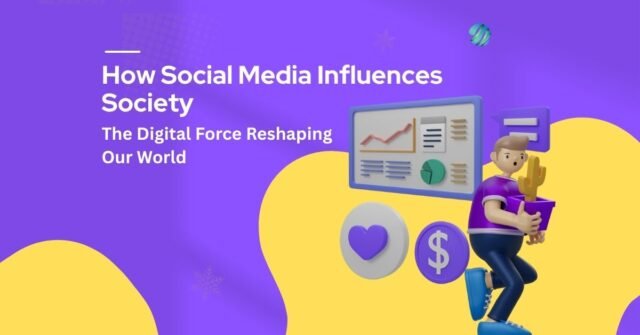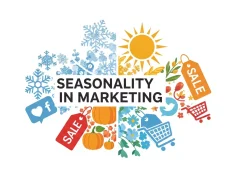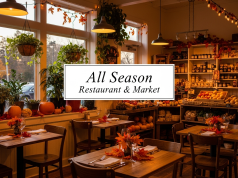Social media has become so enmeshed in the fabric of our daily existence, from the morning scroll through Instagram to late-night screen arguments on Twitter. But its influence is not limited to the pictures of lattes and vacation selfies that abound there. Social media has revolutionized the way in which we communicate, express opinions, and even share cultures. This blog discusses the deep effects social media has on society, and what the means for us as individuals.
The Ascension of Social Media in Our Society
In the more than two decades since, those social media platforms have evolved into something beyond connecting with friends and family. Platforms like Facebook, Instagram, TikTok, LinkedIn and others increasingly serve as news, entertainment, educational, activist and commercial hubs. Did you know that there are currently 4.9 billion people using social media worldwide in 2023? That represents more than half the planet!
This increasing popularity has turned social media into a potent force of change. It creates global dialogues and challenges institutions and introduces new cultural shifts beyond personal connections. But how does that influence materialize in practical terms?
How Social Media Influences Communication Between People and Relationships
Redefining How We Connect
It’s the age of social media where we can stay connected with a friend from across the world, as they live post their way through their day, in real-time! Apps like WhatsApp and Facebook Messenger have made long-distance communication feel magical rather than difficult. From letting you share what’s up in your life with your friends, to getting you in touch with a teammate who lives miles away, social media makes everything possible—the possibilities are endless.
But accessibility has it’s issues. The emergence of so-called parasocial relationships (one-sided connections with influencers or celebrities) is an example of how social media enables relationships that feel personal even though they’re not truly reciprocal.
Changing Social Interactions
And now the ability to “like,” comment on or share anything has upended our interaction in new ways. Social media promotes cross cultural and social interactions, but can also engender shallow help, where “likes” become a form of social approval. For instance 65% of teenagers feel that social media places unnecessary pressure on them to keep up a false online image.
To offset this, many platforms are now fostering healthier engagement. Instagram’s decision to enable users to hide “like” counts is a small step toward addressing these pressures.
The Age of Digital Activism
And with its potential to reach millions of people, social media has become a crucial weapon for the foot soldiers of grassroots activism. Hashtags like #BlackLivesMatter and #MeToo have raised unheard voices and forced social causes onto the world stage. These digital spaces have the potential to effect real-world change, whether it’s as a fundraising or policy advocacy tool.
But some critics warn against a surge in “slacktivism,” a trend where users voice support online without backing it up with real-world activities. This shows the importance of balancing meaningful dialogue online with real world action.
The Impact of Social Media on Knowledge and Opinions
New Information Superhighway
It is no longer the era of the coveting of the 6 p.m. nightly news. For so many now, social media streams are our news. In fact, 47% of U.S. adults report getting their news from social media, said a study by Pew Research. For example, platforms such as Twitter are fantastic at providing breaking news in near real time, in many cases far exceeding traditional news outlets.
But there is a catch to this accessibility. Information overload also includes misinformation. Both fake news and clickbait headlines and echo chambers also provide opportunities to misrepresent reality and sustain public misconceptions. The challenge for our society is to move towards a critical digital literacy to sort the wheat from the chaff.
Shaping Public Opinion
Algorithms fuel social media, where an emphasis on keeping users engaged is at odds with the objectives of public health agencies. These algorithms, however enjoyable, can amplify bias because they show users things that agree with what they already believe. This issue, called the “filter bubble,” narrows viewpoints and may isolate citizenry.
Consider political debates, for instance. During elections, platforms have the potential to build echo chambers, in which users are shown only content that plays to their political sympathies. The result? More factions, less real conversation.
Economic Fact of Life: The Balance of Social Media
Feeding Entrepreneurs and Small Businesses
Access to entrepreneurship is democratized by social media. Whether you sell hand-knitted scarves on Etsy and want to market to potential customers the world over, or need to grow interest in a coaching business on Instagram, the platforms can provide low-cost ways to do so. Marketing-related tools such as Facebook Shops, Instagram Ads and LinkedIn promotions can help make marketing easier—enabling small businesses to succeed.
For instance, the short-form content format at TikTok has given birth to many small brands that just took off overnight. Imagine creators using the platform to show off products, and to reach the millions of viewers that would not be available to them without promo dollars.
The Age of the Influencer Economy
Influencers, from YouTubers to beauty bloggers, are changing the way that brands reach their audiences. These partnerships frequently seem more intimate to consumers than traditional ads. Global Market Research firm Statista predicts that the influencer marketing industry will surpass 21.1B USD by 2024.
This economy presents both opportunities and ethical questions, including the truth of endorsements and hidden sponsorships. Transparency is going to be very important as regulations grow in this area.
The Impact of Social Networking Sites on Mental Health
Great Connectivity Brings Great Responsibility
It is exhausting to be constantly on the receiving end of filtered and posed perfection and it’s only natural to make crazy comparisons and feel inadequate.
The Highlight Reel Effect
On platforms, people tend to see the “highlight reels” of users’ lives, and it can seem like others have more exciting, successful or perfect lives. It’s particularly pronounced among a younger audience. Research has found that spending too much time on platforms such as Instagram can be tied to anxiety and depression.
Steps Forward
Acknowledging the potential harm that the service can cause, some platforms and groups are moving to bolster mental health. Features including screen time management instruments, access to mental health resources and AI content moderation are designed to help counteract some of the harmful aspects of social media.
Using Social Media Responsibly
The internet is a powerful thing, and so is social media. Here are some tips:
- Filter your feed: Unfollow accounts that make you feel bad or feed into unrealistic expectations. Follow pages that motivate or teach you.
- Scraps the screen time: Establish daily limits to stop scrolling time from getting out of hand. Apps like Moment and RescueTime can be helpful.
- Participate thoughtfully: Comment where possible, and contribute to other comments and communities in a positive manner.
- Double check: Always check the credibility of news and sources before sharing.
Factors of the Future of Social Media in Society
Social media really isn’t good or bad at its core. Its impact largely depends on how we actually use it. Although it spurs creativity, connection and collaboration, it also presents challenges that need attention, including disinformation, mental health effects and societal divides.
By using social media more intentionally, we can reap its benefits while minimizing its costs, leaving us with a more equitable, informed, and connected world.
If you’re interested in more tips on how to become more intentional with your technology (or the inverse, intentional about how you use social media for business), check out some of our resources or subscribe to our updates. With your help, we can all make social media work for good.
You can Learn more about: How to Become a Social Media Influencer









